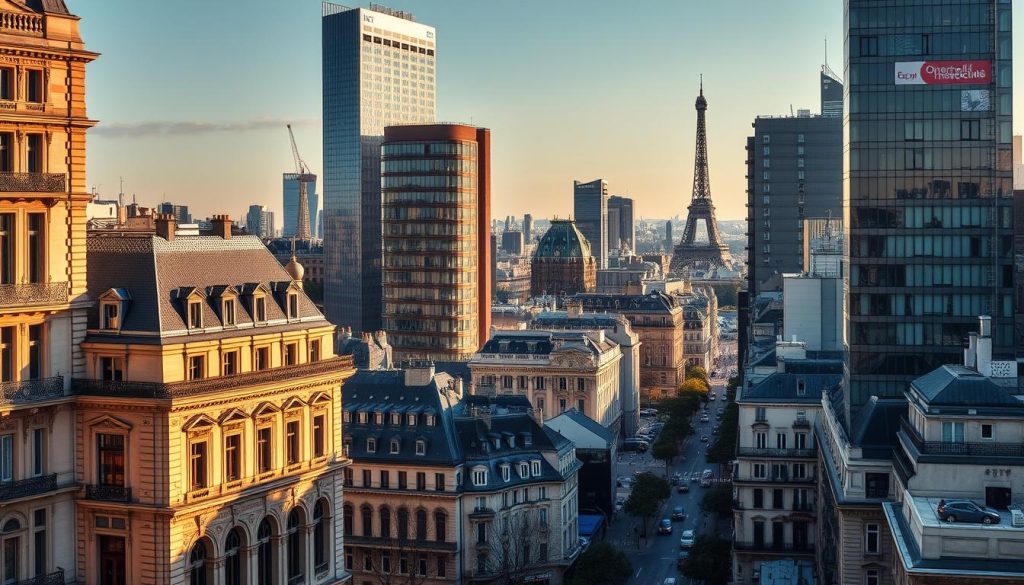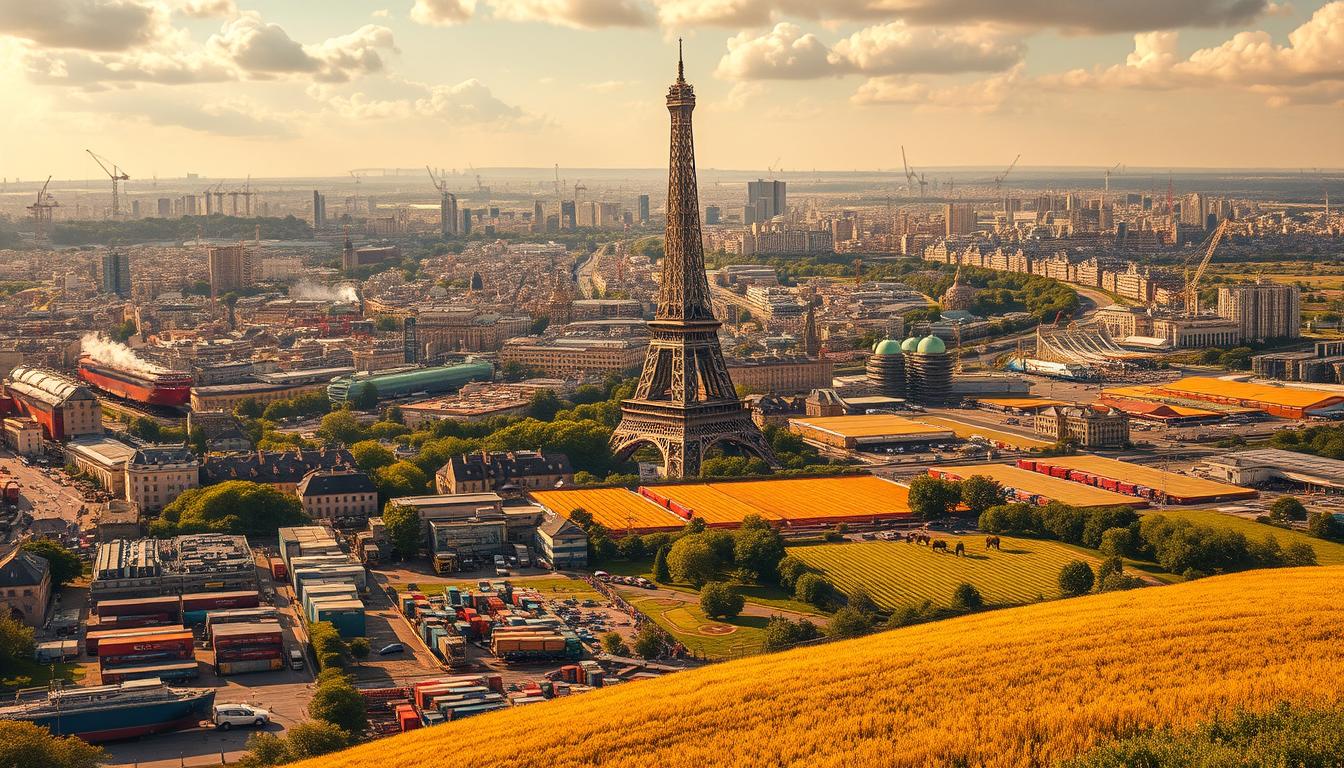Looking into France’s main income source, we find a mix of economic sectors. These sectors include services, agriculture, tourism, and manufacturing. They all play a key role in France’s wealth.
Each sector is important for our economy. They show how strong France’s economy is. They also tell us about the role of each sector in our financial world.
Overview of France’s Economy
The France economy is complex, with many factors at play. We look at GDP growth, inflation, and unemployment. These are key to understanding France’s financial health.
Key Economic Indicators
Important economic signs help us see how France is doing. The GDP growth rate changes, influenced by home and global issues. Inflation affects how much people can buy and business spending.
Unemployment rates tell us about the job market. They show if the economy is stable or not.
GDP Composition
The GDP shows what sectors contribute most to France’s economy. The services sector, like tourism and finance, is big. It shows France’s focus on these areas.
The industrial sector is also important, with a push towards tech and new ideas. Even though it’s smaller, agriculture is key in some areas. It shows France’s farming history.
Historical Context of Economic Development
Looking into French economic history, we see a story of big changes. These changes have shaped our economy from a simple farming society to a strong industrial nation. Understanding these changes helps us see the complexity of France today.
Economic Milestones
Our economic history is marked by important events:
- The Agricultural Revolution in the 18th century started a big increase in farming productivity.
- The Industrial Revolution in the 19th century brought France into a new era. It led to more people moving to cities and changed how we live and work.
- After World War II, France focused on rebuilding and growing its economy. This was driven by new ideas and hard work.
Each of these moments was a turning point in our economy. They have shaped our policies and practices that we see today.
Transition from Agriculture to Industry
The move from farming to industry was a key part of our economic growth. At first, farming was the main way people made a living. But as industry grew, things changed:
- By the 20th century, many people moved from farms to cities for industrial jobs.
- New industries like textiles, cars, and planes became big. This made farming less important.
- Support for new ideas and investments helped speed up this change. It made France more competitive worldwide.
This change made our economy more diverse. It balanced our farming roots with the power of industry.

Primary Industries Driving Income
In France, the main industries are key to our income. The services sector is a big help, providing vital services that keep our economy stable. The manufacturing sector is also important, with many high-value industries that boost our exports.
Services Sector
The services sector in France includes finance, retail, and healthcare. It’s a big part of our economy. With digital changes, these businesses have become more efficient and connected with customers. Banking and tourism are big money-makers, showing how important this sector is.
- Finance: Big banks like BNP Paribas and Société Générale lead in global banking.
- Retail: Brands like Carrefour and LVMH grow retail and create jobs.
- Healthcare: Our public healthcare system makes sure everyone has access to medical care.
Manufacturing Sector
The manufacturing sector in France is also key, with a variety of industries like automotive, aerospace, and technology. Focusing on high-tech products helps our exports. Companies like Airbus and Renault show off innovation in design and production.
| Industry | Major Companies | Export Value (€ billion) |
|---|---|---|
| Automotive | Renault, Peugeot | 46 |
| Aerospace | Airbus, Safran | 45 |
| Technology | Thales, Atos | 15 |
Tourism: A Vital Source of Revenue
France is a top tourist spot, welcoming millions every year. The tourism numbers show how key this sector is. With its history, food, and culture, tourism boosts the economy a lot. It’s a big help to both the country and local areas.
Statistics on Tourism in France
France is always among the most visited countries. Last year, about 90 million tourists came, adding a lot to the economy. This helps keep jobs in many areas, like hotels and shops.
More people visiting means more money for the country. It shows how important tourism is for our economy.
Impact of Tourism on Local Economies
Local areas really feel the tourism effect. Small shops, restaurants, and hotels do well. They get more customers, which means more money for them.
This helps local jobs and skills grow. Tourism does more than just make money. It also helps share cultures and improve areas.

Agriculture’s Role in the Economy
French agriculture is very important for the country’s economy. It creates jobs and boosts exports. Products like wine, cheese, and cereals are key. They help the economy and show the value of agriculture in our lives.
Major Agricultural Products
France is famous for its wide range of agricultural products. Some of the most notable include:
- Wine: France leads the world in wine production. Places like Bordeaux and Champagne are well-known.
- Cheese: France has many types of cheese, like Roquefort and Camembert. They are loved everywhere.
- Cereals: France is a big producer of wheat and barley. These are used for food and animal feed.
Challenges Facing French Agriculture
Despite its importance, French agriculture faces many challenges. These include:
- Climate Change: Changes in the weather affect crops and animals. This is a big risk for food security.
- Market Fluctuations: Prices for farm products can change a lot. This can hurt farmers’ incomes and make farming hard to keep up.
- EU Agricultural Policies: Rules from the EU can help or hinder farming. They affect how farmers work across the country.
Financial Services Sector
The financial services sector is key to France’s economy. It includes banking, insurance, and investment management. Paris, as a major financial hub, attracts international interest.
This city is a global centre for financial deals. It helps with foreign investments and hosts big company headquarters.
Importance of Banking and Finance
Banking and finance are at the heart of France’s financial services. Big names like BNP Paribas, Société Générale, and Crédit Agricole offer a range of products. They help both individuals and businesses.
These banks keep the economy moving with their capital. They also support new businesses. Rules help keep things stable, drawing in companies from abroad.
Global Influence of Paris as a Financial Hub
Paris is a top financial hub worldwide. It’s a big part of our economy at home and abroad. It has a great investment climate and a skilled workforce.
These things make Paris a magnet for big companies. They come to set up in Europe, boosting the local economy. This makes France a major player in finance globally.

Technology and Innovation in France
The tech sector in France has grown a lot in recent years. It’s now a key part of the country’s economy. We see big steps forward, like in artificial intelligence and software.
Let’s look at the trends and investments that are shaping the future of tech startups in France.
Growth of the Tech Sector
The tech sector in France is changing fast. Both big companies and new startups are helping it grow. The government supports innovation, creating a great place for startups.
Cities like Paris and Lyon are becoming major tech hubs. They attract talent and investment. Companies like Dassault Systèmes and Orange are doing well, and new startups are exploring new areas like fintech and health tech.
Startups and Investments
Startups are booming, leading to more venture capital. This money helps create jobs and grow the economy. Startups are getting bigger, meeting market needs, and going global.
Places like Station F in Paris help entrepreneurs work together. This boosts innovation. The mix of creativity and tech leads to big breakthroughs. These improve our lives and make France stronger globally.
| Year | Amount Invested (in Billions €) | Number of Startups Founded |
|---|---|---|
| 2018 | 2.5 | 980 |
| 2019 | 3.2 | 1,152 |
| 2020 | 4.5 | 1,300 |
| 2021 | 5.7 | 1,450 |
| 2022 | 6.3 | 1,620 |
The Influence of International Trade
International trade in France is key to our economy and global ties. We explore trade, focusing on France’s big trading partners and import export activities. Trade agreements shape these relationships, bringing both chances and hurdles in different areas.
France’s Major Trading Partners
France’s trade scene is marked by strong bonds with several major partners. Our biggest trades are with Germany, Italy, and the United States. These partnerships, driven by close geography and agreements, make trade easier.
Here’s a list of our main trading partners:
- Germany
- Italy
- United States
- Spain
- United Kingdom
Import and Export Dynamics
France’s import export scene shows a wide variety of goods and services boosting our economy. Key items include machinery, vehicles, and farm products. These show our production power and meet international needs.
By studying these trends, we see how trade moulds our economy.
| Commodities | Import Value (£ billion) | Export Value (£ billion) |
|---|---|---|
| Machinery | 50 | 45 |
| Vehicles | 40 | 60 |
| Agricultural Products | 25 | 35 |
| Pharmaceuticals | 30 | 55 |
Knowing these trade trends in France, with our trading partners, helps us in the global market. Strong relationships and market adaptation lead to a thriving trade scene. This benefits everyone involved.
Energy Sector Contributions
The energy sector in France is key to our economy. It supports many industries. We’ll look at new developments in renewable energy, like wind and solar power. We’ll also talk about nuclear power’s role in keeping our energy safe and meeting environmental goals.
Renewable Energy Developments
There’s a big push for renewable energy now, focusing on being green and cutting carbon emissions. France has grown its renewable energy facilities, mainly in wind and solar. The government helps with incentives and policies to improve energy use.
- Wind energy capacity reached 18,000 MW in 2022, making it a dominant force in the renewable sector.
- Solar power installations increased by over 20% annually, demonstrating a growing commitment to harnessing sunlight.
- Investments in renewable infrastructure are expected to exceed €50 billion by 2030.
Nuclear Energy’s Role
Nuclear power is a big part of France’s energy mix. It makes up about 70% of our electricity, making us a leader in nuclear energy. This reliance on nuclear power has many benefits:
| Aspect | Detail |
|---|---|
| Carbon Emissions | Minimal, contributing to our climate goals. |
| Energy Security | Stable and reliable energy source to meet national demand. |
| Job Creation | Thousands of jobs in both operation and maintenance of plants. |
As we move towards a greener future, combining renewable energy and nuclear power will be key. It will help us meet our economic and environmental goals.
Real Estate and Construction
The real estate sector is key to France’s economy, affecting both business and daily life. Many things influence the housing market, like population changes, economic status, and government rules. We see a mix of growth and stability in the housing market today. It’s vital to understand these trends for those thinking about investing in France.
Housing Market Overview
The housing market in France has its own traits, affecting prices and availability. Cities like Paris, Lyon, and Marseille have a lively market with high demand, mainly in urban areas. Yet, there’s a growing interest in rural and suburban properties, showing a change in lifestyle choices.
- Increased demand in urban areas: Major cities continue to see price stability due to limited supply.
- Rising interest in rural properties: Many buyers are now looking for retreats in the countryside, leading to a competitive market.
- Regulatory housing policies: Recent reforms aim to encourage sustainable housing development and accessibility.
Investment Opportunities
Real estate in France is drawing both local and foreign investors. The residential sector offers a range of choices, from small city apartments to large suburban homes. Commercial real estate also offers good opportunities, mainly in retail and office spaces.
- Residential properties: Ideal for long-term rental income, with strong demand in busy urban areas.
- Commercial real estate: Attractive for those seeking newer investment avenues, with the rise of online business.
- Emerging regions: Investing in less explored areas is becoming popular, with high returns and lower costs.

Cultural and Creative Industries
France’s cultural industries are key to its identity and economy. The creative sector, led by fashion and luxury, showcases French talent. It sets global trends, celebrated worldwide.
Fashion and Luxury Goods
The fashion industry is a highlight in France. Brands like Chanel, Louis Vuitton, and Dior stand for French luxury. Paris, as a fashion capital, hosts Paris Fashion Week, drawing global attention.
Fashion’s economic impact is huge. It adds billions to France’s economy and creates many jobs.
Film and Arts Contributions
Film and arts add to France’s cultural richness. French cinema is known for its unique stories and art. It wins international praise, with many festivals and an active indie scene.
The film sector boosts jobs, tourism, and cultural exchange. It’s vital for France’s creative sector. Cultural industries in France boost national pride and keep the economy strong.
Impact of EU Membership on Income Sources
France’s economic scene has changed a lot because of the EU. Being part of the EU has brought us closer to our European friends. It has also opened up new ways for us to grow and earn money.
We see these benefits every day. They come from better trade deals and stronger rules that help us make money.
Economic Benefits of EU Membership
Being in the EU has given us big economic wins. We can sell our goods and services to over 500 million people without paying high taxes. This makes things cheaper and more available for everyone.
Our businesses also get help from EU money for new ideas and green projects. This keeps us competitive in the global market.
Trade Agreements and Policies
Trade deals are key to our economy. France is part of many EU talks that lead to good deals with other countries. These deals help us sell more abroad.
By following EU rules, we grow our influence worldwide. Our businesses get the support they need to succeed.
| Element | Impact |
|---|---|
| Single Market Access | Increased exports with reduced tariffs |
| EU Funding | Support for innovation and infrastructure |
| Trade Agreements | Expanded markets for French products |
| Regulatory Alignment | Standardised practices enhacing competitiveness |
Challenges and Future Outlook
France’s economy faces many challenges. Unemployment, mainly among the young, is a big worry. Economic gaps between regions have grown, causing social problems. Global events, like the pandemic, have made things even harder.
Fixing these issues is key to a strong economy that benefits everyone.
Economic Challenges Facing France
Several factors are causing France’s economic troubles:
- Persistent unemployment rates, mainly among the young.
- Increasing economic inequality, with a big gap between cities and countryside.
- The economic effects of global crises, from health emergencies to market changes.
- Demographic changes, like an ageing population, changing the workforce.
Predictions for Future Growth
Looking ahead, France’s economy has a chance to grow. New tech and green practices could boost many sectors. Investing in green tech could create jobs and lead to sustainable businesses.
Improving international relations and trade could also help. These steps could make the economy stronger and more inclusive.
| Economic Factors | Current Situation | Future Potencial |
|---|---|---|
| Unemployment | High youth unemployment | Job creation through innovative industries |
| Economic Inequality | Growing disparity | Targeted policies for equitable growth |
| Global Events Impact | Significant disruptions | Opportunities in crisis management and recovery |
| Green Technology | Emerging investments | Major contributor to future growth |
Conclusion: A Balanced Economic Landscape
France’s economy is strong thanks to many different sectors. The services and tourism industries are booming. So are agriculture and manufacturing. Each one helps the economy grow.
This mix of sectors makes France stable. It helps the country face global economic challenges well.
Looking at economic diversity, we see why relying on one sector is bad. France’s economy is strong because it has energy, innovation, and more. This variety brings in money, creates jobs, and adds to culture.
For France’s future, keeping the economy balanced is key. Supporting all sectors is vital for our success. This way, France will stay strong and vibrant globally.







